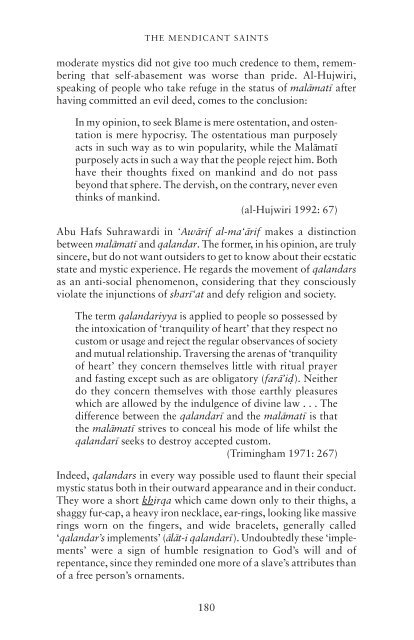Muslim Saints of South Asia: The eleventh to ... - blog blog blog
Muslim Saints of South Asia: The eleventh to ... - blog blog blog
Muslim Saints of South Asia: The eleventh to ... - blog blog blog
You also want an ePaper? Increase the reach of your titles
YUMPU automatically turns print PDFs into web optimized ePapers that Google loves.
THE MENDICANT SAINTS<br />
moderate mystics did not give <strong>to</strong>o much credence <strong>to</strong> them, remembering<br />
that self-abasement was worse than pride. Al-Hujwiri,<br />
speaking <strong>of</strong> people who take refuge in the status <strong>of</strong> malāmatī after<br />
having committed an evil deed, comes <strong>to</strong> the conclusion:<br />
In my opinion, <strong>to</strong> seek Blame is mere ostentation, and ostentation<br />
is mere hypocrisy. <strong>The</strong> ostentatious man purposely<br />
acts in such way as <strong>to</strong> win popularity, while the Malāmatī<br />
purposely acts in such a way that the people reject him. Both<br />
have their thoughts fixed on mankind and do not pass<br />
beyond that sphere. <strong>The</strong> dervish, on the contrary, never even<br />
thinks <strong>of</strong> mankind.<br />
(al-Hujwiri 1992: 67)<br />
Abu Hafs Suhrawardi in ‘Awārif al-ma‘ārif makes a distinction<br />
between malāmatī and qalandar. <strong>The</strong> former, in his opinion, are truly<br />
sincere, but do not want outsiders <strong>to</strong> get <strong>to</strong> know about their ecstatic<br />
state and mystic experience. He regards the movement <strong>of</strong> qalandars<br />
as an anti-social phenomenon, considering that they consciously<br />
violate the injunctions <strong>of</strong> sharī‘at and defy religion and society.<br />
<strong>The</strong> term qalandariyya is applied <strong>to</strong> people so possessed by<br />
the in<strong>to</strong>xication <strong>of</strong> ‘tranquility <strong>of</strong> heart’ that they respect no<br />
cus<strong>to</strong>m or usage and reject the regular observances <strong>of</strong> society<br />
and mutual relationship. Traversing the arenas <strong>of</strong> ‘tranquility<br />
<strong>of</strong> heart’ they concern themselves little with ritual prayer<br />
and fasting except such as are obliga<strong>to</strong>ry (farā’id˝). Neither<br />
do they concern themselves with those earthly pleasures<br />
which are allowed by the indulgence <strong>of</strong> divine law ... <strong>The</strong><br />
difference between the qalandarī and the malāmatī is that<br />
the malāmatī strives <strong>to</strong> conceal his mode <strong>of</strong> life whilst the<br />
qalandarī seeks <strong>to</strong> destroy accepted cus<strong>to</strong>m.<br />
(Trimingham 1971: 267)<br />
Indeed, qalandars in every way possible used <strong>to</strong> flaunt their special<br />
mystic status both in their outward appearance and in their conduct.<br />
<strong>The</strong>y wore a short khirqa which came down only <strong>to</strong> their thighs, a<br />
shaggy fur-cap, a heavy iron necklace, ear-rings, looking like massive<br />
rings worn on the fingers, and wide bracelets, generally called<br />
‘qalandar’s implements’ (ālāt-i qalandarī). Undoubtedly these ‘implements’<br />
were a sign <strong>of</strong> humble resignation <strong>to</strong> God’s will and <strong>of</strong><br />
repentance, since they reminded one more <strong>of</strong> a slave’s attributes than<br />
<strong>of</strong> a free person’s ornaments.<br />
180


